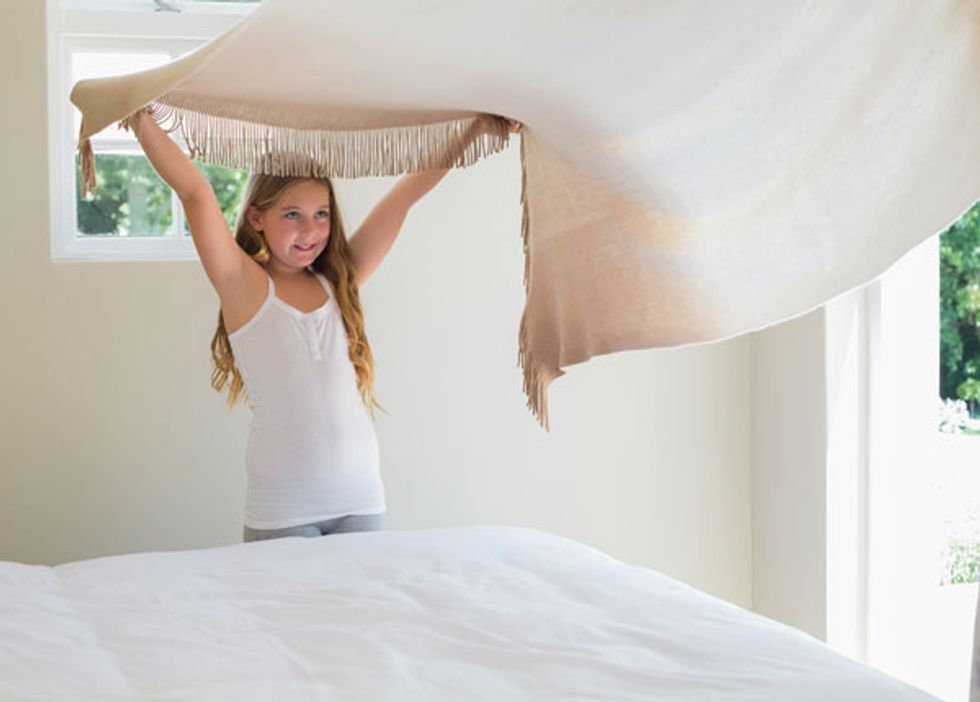When you have a house full of kids, it seems like the chores never end. Vacuuming, mopping, folding laundry—the list goes on and on. But you don't have to put the burden all on yourself. Kids can and should help with chores. They may whine at times, but if you play your cards right, they may even want to offer up their assistance.
First, devise a list of what needs to be done and then divide it among the family members. Each child can have one or two jobs. Then give them specific, simple and short directions on what you want done. "I want your playroom clean" is a broad and general statement that is a bit overwhelming for anyone. Say something more specific, such as, "Put all the dolls in that box."
Just be realistic and patient with your expectations, relaxing your standards. Remind yourself that if you redo their work, they'll only get discouraged and rely on you to do the job. That's why you should assign them tasks that you're comfortable if they're done imperfectly.
Applaud, praise and thank them for whatever efforts they put forth. Be supportive, encouraging and appreciative. To get them to do it better next time, do the chore together so your children can see what you're doing and what they could improve upon.
Here are a few tactics to help get kids in on the act of keeping the house orderly and clean:
- Guide them along. Give them age-appropriate assistance. For example, for kids who can't read, attach a picture of toy cars to the box where they go.
- Curb the clutter. It's always easier to clean when you don't have so much to pick up to begin with. Sort through toys and clothing every few months and donate ones that the kids don't play with or wear anymore. Throw away anything that isn't in good enough condition to donate. You might want to hold a yard sale to help get rid of some items, too, and then donate whatever you don't sell.
- Plan it out and make it fun. Develop a chore chart with the kids' names, chores and when they need to be done. Rotate the chores weekly or monthly so the kids get competent at chores without getting bored with them. Kids who complete their chores get a sticker. And at the end of the week or month, they get a small prize. On days when you're doing an all-out cleaning, give a treat when the kids complete their chores to your satisfaction.
- Set a time frame. A younger child will likely complete a chore as soon as you ask him to do it. But for an older child, tell him when you want something done, such as before he goes to soccer practice or after he finishes his homework.
Personal Chores
Personal chores help children learn how to take care of themselves. Some examples are listed below. The level of supervision depends on their age.
- Setting alarms, getting out of bed on their own
- Making beds, stripping linens
- Cleaning toys in their room
- Putting away laundry
- Taking care of personal hygiene like brushing their teeth or combing their hair
- Choosing outfits, dressing themselves
Household Chores
Some good household jobs for kids are outlined below. The level of supervision depends on their age.
- Sorting and folding laundry
- Refilling supplies like toilet paper or soap dispensers
- Dusting shelves and furniture
- Cleaning the bathroom, such as spraying and wiping down the outside and inside of toilets, sinks, tubs and showers (you can divide up different parts of the bathroom for each child)
- Cleaning the kitchen by wiping down tables, counters, sinks and chairs with a wet rag
- Setting and clearing the table, emptying the dishwasher
- Emptying trash cans and replacing the bags, sorting recycling
- Taking care of pets such as feeding them, walking them or bathing them
- Watering plants
- Vacuuming carpets
- Mopping floors







